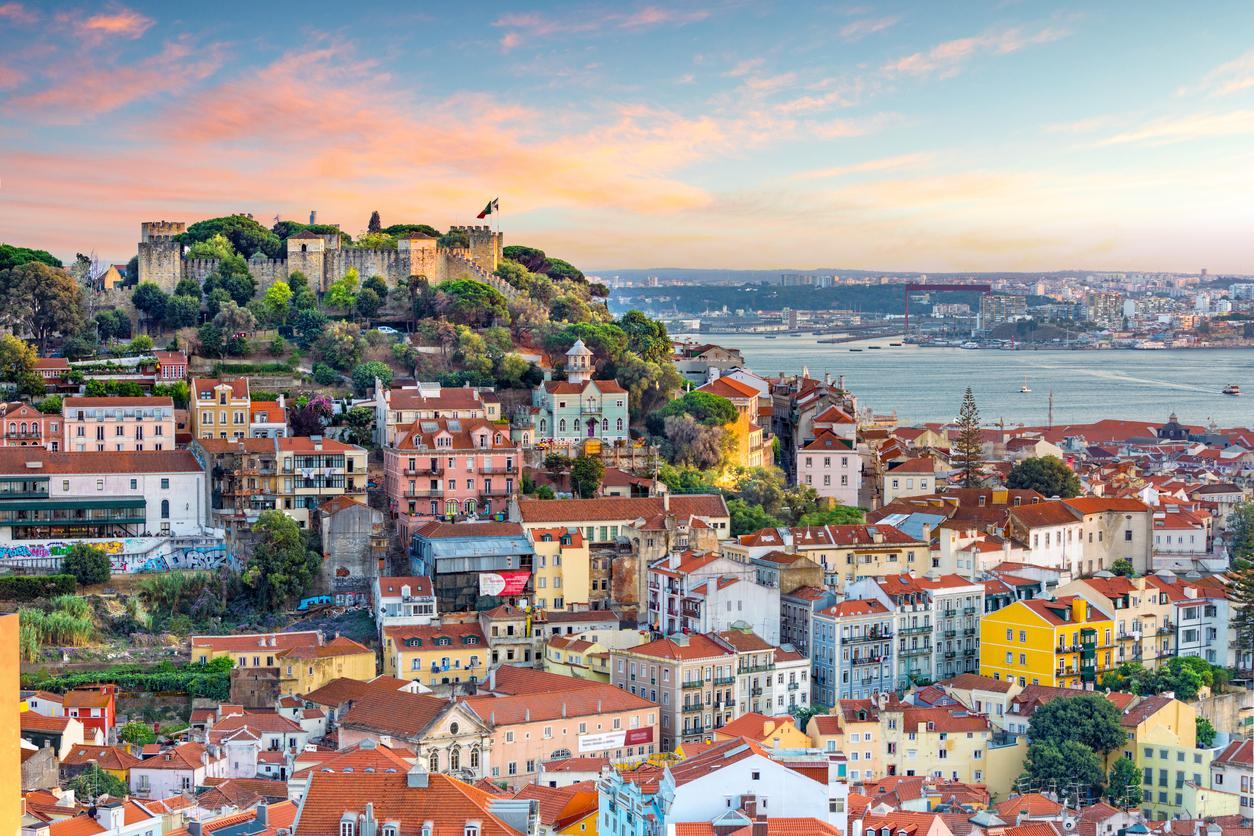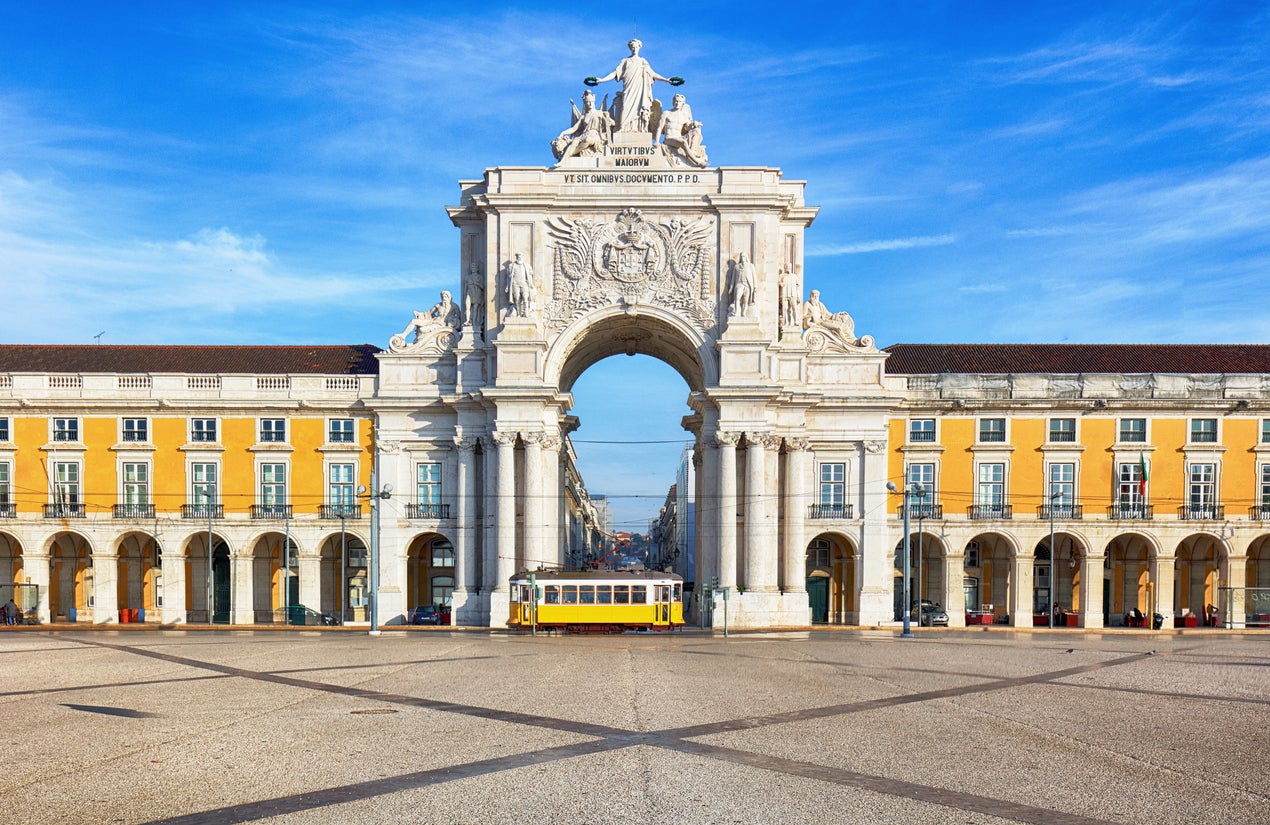The Independent's journalism is supported by our readers. When you purchase through links on our site, we may earn commission.
How to visit Lisbon without leaving home
Armchair Travel: Experience the Portuguese capital from where you are

A sun-licked city on Portugal’s Atlantic coast, it’s little wonder that Lisbon has long tempted visitors into a weekend getaway.
One of the oldest capitals in Europe, the tangle of skinny, storied streets that make up Old Town Lisbon promise history, culture and lived-in beauty at almost every turn.
While life in the time of coronavirus means Portugal’s capital is temporarily out of bounds, you can still pore over the city’s greatest assets through your computer screen.
Here’s how to immerse yourself in all things Lisboa from the comfort of your own sofa:
What to do
Go for a tram ride
Wind through Lisbon from aboard its iconic mustard yellow trams: a feature of the cityscape since the early 1900s. This three-minute virtual tour, produced by the Portuguese tourism board, plants web surfers in the plum spot of the driver’s seat on vintage “eletrico” 28.

You’ll rattle around the cobbled streets of Lisbon’s oldest neighbourhood, Alfama; trundle past candy-coloured buildings that cascade down the city’s eight hills; traverse wide pracas (squares); and peer out across a sliver of the river Tagus, glimmering in the distance. It’s a remarkably soothing and immersive ride.
See the city’s sights close up
For more in-depth coverage of the city’s biggest scene-stealers turn to this interactive guided tour, by Sygic Travel. Just pull the mouse across the screen for 360-degree views, accompanied by full commentary.
You’ll cop a close-up of the towering wrought-iron neo-gothic Santa Justa Lift, enjoy panoramic views of the city from its highest hill, Graca, gaze up at 16th-century Belem Tower, and look down the bustling pedestrianised shopping street, Rua Augusta.
Head for the museums
Now that you’ve got a feel for the city, get to the real guts of it with a tour around the most venerated cultural establishments.
Of the more niche local institutions, there’s the National Coach Museum. Featuring opulent vehicles from the 17th, 18th and 19th centuries that once belonged to the Portuguese monarchy, it is, apparently, the most visited museum in Portugal, and represents the largest and most valuable collection of its type in the world.
From simple sedan chairs to wildly ornate gilded wooden carriages inlaid with ivory, upholstered with silks and festooned with sculptures of Greek gods, you can size up the stagecoaches, literally: there’s a measurement mode on the virtual 4D tour that allows you to check each vehicle’s vital stats. Find further detail on the items exhibited at Google’s Arts and Culture hub.
There’s also a glut of alternatives available on the very same hub – 25 to be precise.
Explore the National Azulejo Museum, Jeronimos Monastery, the National Archaeology Museum and more. There are numerous online exhibits too, named “stories”, which document everything from bold street art in the coastal capital, to puppetry.
The artist’s view
Art aficionados should turn to the 360-degree virtual tour on offer at the Calouste Gulbenkian Museum – home to one of the largest private collections of art in the world.
Works in the permanent Founder’s Collection have been plucked from across the globe, and span from classical antiquity to the mid-20th century. Expect to spot pieces by Rembrandt, Renoir and Rodin, among others. Works in the permanent Modern Collection – considered to be the most complete collection of modern Portuguese art in the world – date from the end of the 20th century to the present.
Local flavours

Portuguese cuisine may not be as widely acclaimed as that of neighbouring Spain, but the local culinary canon is surprisingly vast.
From hole-in-the-wall pastelarias (pastry shops) turning out creamy, charred, palm-sized pastéis de nata, to cosy tasquinha (small taverns) dishing up hearty plates of home-cooked classics such as smoky grilled sardines and flame-licked frango (chicken), this city is host to countless food experiences.
Yet fear not: you can still bring Lisbon’s food to life at home with the following cookbooks.
One of the most well-known advocates of Portuguese food, Lisbon native Nuno Mendes has helmed a bevy of kitchens across London over the last decade. In his delightfully nostalgic ode to Portuguese cookery, Lisboeta: A Cookbook from Portugal’s City of Light, recipes are interspersed with memories of Mendes’ childhood in Lisbon, as well as beautifully stark photography that transports you straight into the heart of the city.
Whip up a smorgasbord of comforting salgados (savoury fried snacks), such as minced prawn turnovers, or try your hand at the satisfying one-pot recipes, such as Portuguese fish stew, or caldeirada. Mendes even dedicates a whole chapter to the humble Portuguese sandwich.
Those hungry for more of a haute-cuisine take on Iberian classics should dip into My Portugal: Recipes and Stories, from Nuno’s contemporary across the pond, George Mendes.
A chef who partakes, largely, in new spins on old Portuguese classics, many of the recipes demand a well-stocked larder (think quail, foie gras and sea urchin), and a degree of culinary prowess (hello baby goat with beets, cinnamon-clove yoghurt and charred bread emulsion).
For a less technical introduction, try Lisbon: Recipes from the Heart of Portugal, by journalist Rebecca Seal. A colourful, chatty and accessible tome that invites readers into the capital’s bustling bars and restaurants and serves up deliciously simple dishes, such as fresh sardines on toast and piri piri chicken.
Setting the scene
There is surely no soundtrack more evocative of Lisbon than fado – a melancholic folk music born here in the 1820s. The musical genre has, in fact, become so entangled with Lisbon’s identity that it was inscribed on UNESCO’s Intangible Cultural Heritage List in 2011.
Leaf through the digital sound archive of the Fado Museum of Lisbon, which includes thousands of fado recordings from the beginning of the 20th century.
For a taste of the capital’s crumbling charm on paper, try Night Train to Lisbon by Pascal Mercier, or Requiem: A Hallucination, by Antonio Tabucchi.
The former is a thriller that interweaves life under Salazar’s dictatorship with a modern-day mystery and has since been transformed into a film starring Jeremy Irons. The latter is a reflective literary novel, with a full cast of colourful local characters, which takes place over just one hot summer’s day in the city and pays homage to the country’s most celebrated author, Fernando Pessoa.
Bring it home
Stock up your pantry with all kinds of Portuguese staples from A Portuguese Love Affair: purveyors of tinned sardines bathing in all kinds of oils and sauces, plus traditionally made black pudding (morcela), artisanal goat’s cheese, and plenty more.
No self-respecting virtual tourist should leave virtual Lisbon without clutching some fanciful take on azulejos – the glazed ceramic tiles, often painted in azure and white, that adorn chapels, courtyards, palaces and kitchens across the city.
Artsy online emporium A Vida Portuguesa offers azulejos in the most practical form of coasters or pot stands, as well as embroidered tableware, locally made soaps and quaint silver pendants, all by homegrown designers.
Anything else?
Before diving into any recipes, it’s only right to start with an appetite-stoking aperitif.
The porto tonico, or P&T, if you like, is a Portuguese classic that requires little in the way of ingredients. It’s a simple two-to-one ratio of tonic water to white port, garnished with a wedge of citrus, or a ribbon of cucumber.
Other local failsafes include a bottle of zippy vinho verde (which you can buy from Portuguese wine specialist Bar Douro’s online bottle shop) or an ice-cold Sagres – just a few sips and you’ll be virtually basking in the sunshine in one of Lisbon’s rooftop bars, the breeze toying with your hair.
Join our commenting forum
Join thought-provoking conversations, follow other Independent readers and see their replies
Comments